Fr. Stephen Powley is the priest at St. John the Baptist Greek Orthodox Church in Pueblo, Colorado. Besides being a very active priest, he is a very physically active man—he loves trail running and biking, hiking, backpacking, and mountain climbing in the mountainous state where he lives.
Before beginning his religious service, Fr. Stephen worked for the federal Forest Service as a smokejumper, parachuting into wilderness areas to fight forest fires, and for the National Park Service, directing the Youth Conservation Corps at the Grand Canyon, Yosemite, and Yellowstone National Parks. He had a dramatic conversion to the Christian Faith while crewing on a sailboat in the Pacific Ocean. That began a spiritual quest for him and his wife.
Fr. Stephen became an Evangelical Protestant pastor after graduating from a Protestant seminary. He and his wife continued their spiritual journey, which led them to the Orthodox Faith. They became convinced beyond any shadow of a doubt that the Orthodox Church was indeed the very same Church that Christ had founded on this earth. They became Orthodox in 1983 before their children were born.
In January of 1985 Fr. Stephen Powley began his ministry as a prison chaplain and served in every level of prison security until his retirement in August of 2010. Fr. Stephen and his matushka now have four grown children.
Fr. Stephen is now executive director of Orthodox Christian Prison Ministries (OCPM), the official prison ministry of the Episcopal Assembly of North and Central America. Founded in 1991, OCPM now ministers to 1000 prisoners who have either converted to Orthodoxy in prison or returned to their Orthodox faith. In the this presentation made several years ago to a Greek Orthodox community, Fr. Stephen talks about how he became a prison chaplain, and how men whom society had written off entirely as unreformable became deeply believing and practicing Orthodox Christians—some of them even became monks, right there in prison.
Back in December of 1984, my wife and I were looking at what we were going to do in the future, and an opportunity came up to apply to a couple of prisons in Arizona as chaplain. And so I put in an application and went for an interview; one of the interviews was for prisoners on death row. There were about a dozen of us candidates for this job, and all of them looked very pastoral; they were in there speaking pastoral words to these men who were on death row, awaiting execution. I thought to myself, “Oh my goodness, I’m way out of their league.” I ended up just chatting with these guys and talking with them about their lives and what they did in there, and lo and behold, in both prisons I came out the number one choice; they called me and said, “We want you to be our new chaplain. After much prayer, we went down to Douglas, Arizona to become the first chaplain of that prison.
When I was filling out the application (believe it or not), my wife said, “If you’re going to apply for the job of chaplain, you had better learn how to spell it right. I had misspelled chaplain when I was applying for the job—like Charley Chaplin. I knew nothing about prisons, I knew nothing about being a chaplain, and I walked in the first day all excited that they were going to teach me how to be a chaplain. I walked boldly into the warden’s office. He stood up, walked around his desk, shook my hand and said, “Welcome, chaplain! Go do what chaplains do!” then he turned around and walked away! I was left there dumbfounded, saying, “Oh my gosh!” With that I turned and walked out and went through all the razor wire and everything else, and walked out into the yard for the first time. As I was walking across the yard, I saw two of the biggest human beings I’ve ever seen in my life. They were leaning up against the wall; they had arms bigger than my body, they were standing there looking at me as I was walking, and I thought, “Oh my gosh. These guys are in prison because they killed a chaplain, I know it!” I thought to myself, “I am not going over there!” I turned and said, “I’m going to go look at this side of the yard first”. And that still small voice of God spoke to me right there. I can still hear that voice saying, “That’s not why I’ve called you here”. The next thing I knew, I was walking over to these “chaplain killers”, reaching my hand out and saying, “Hi, I’m the new chaplain here”. These guys then smiled the biggest smiles, and they said, “Chaplain, we are so glad you’re here! We are so glad. We need you here.” That was my introduction to being a chaplain in a prison—I realized my job was to love these men, not to judge them on what they had done, but just to love them, and to be there, to help them in any way I could.
Well, time passed, and I went from being a state chaplain to a federal chaplain. We were still in Arizona. I had been with this wonderful warden for 4 years, serving under him in a federal prison. The chapel was packed every day, things were going great, and I thought, “This is wonderful!” One day I passed by the warden’s office—he was a deacon in a southern Baptist church, and he spoke with a southern accent… As I was passing by his office he saw me and said, “Son!” (he always called me “son”). “Come on in here, I wanna talk to you.” I went in, and he started telling me about this maximum security prison that was going to be built in Colorado.
He said, “Son, this is going to be the vilest place on the face of the Earth.” He said that there are going to be men there that are beyond all hope. They’ll be throwing feces and urine on staff members, they’ll be trying to kill each other, they’ll be trying to kill staff. He said it’s an ugly, horrible place. I was sitting there saying, “Yes, warden?” Then he looked at me and he said, “Son, I think God’s callin’ you there”. I said “Excuse me, warden?” And he said, “No, now hear me out. We’ve been together for four years. I’ve watched you. I think you’ve got the gifts from God to go and minister in a place like that.” I said, “Well with all due respect sir, I’m going to go pray about it.” He said, “You don’t need to pray, son! Just tell me. I’m gonna make it happen!” I said “No, no. I’m going to go pray.”
I thought, “This is crazy. Where did he come up with that?” So I went back to my lovely wife and I said, “Ashley, you’re not going to believe what the warden said to me today.” I told her all about it. Afterwards she said that about thirty seconds of fear ran through her, and then all of a sudden the peace of God came on her, and she said, “I think it’s the Lord.” I thought, “What do wives know? I’m calling my spiritual father!” So I called my spiritual father, I got him on the phone and told him everything. His immediate words were: “It’s Jesus. He wants you to go be Jesus in that place.” And so, the next Monday I walked into the warden’s office and I quoted Isaiah. I said: “Warden, here am I. Send me.” He pounded his desk and said: “That’s all I need to hear!”
So the next thing I knew, a few months later, we were on our way to Colorado. I got there before any of the men showed up in this prison. I had a chance to pray over this place; I went around and blessed cells, did everything I could think to do to be able to be a chaplain in this place. And in November 1994, the first busloads began to arrive.
In this prison each cell has two doors—there’s a big, solid iron door, and you open It and you walk into what they call a little sally port area, where there are bars. I would always open the outer door and walk in and talk to the men through the bars. One of the first guys I talked to, who had just gotten off the bus, looked at me when I walked in and called me every filthy name, even names I hadn’t heard of. I’m sure they were filthy, but I didn’t even know what they meant. I thought, “Wow. This is going to be a difficult ministry, Lord.” The next day I went back to see this guy and he apologized. He said, “Chaplain, I’m sorry. I was having a bad day.” From there we began a dialogue; in fact with each of these men that came in, I found I just wanted to get to know them, wanted to be there to show that I cared, that I loved them and I was going to make a difference in that place. When I was going up there, I said to myself, “Lord, if you just want me to plough rocks for the next few years, I’ll plough rocks, if that’s all there is to do. I’ll plough rocks. But I pray that you will bring men to your holy faith.”
Well, after we’d been there a while, a man rolled in. The first thing I got from him when he arrived was he had watched our videos and was going to sue me. We had closed-circuit television there, and on the closed-circuit TV I could put videos, and so wherever I would go I’d videotape—I would videotape Divine Liturgies, I’d have studies and we’d put those on the TV as well. I had to put on different videotapes for all the different faiths as well. So, this man wrote me and said, “I’m suing you, because you don’t have any white supremacist videos on your television.” I thought, “Oh boy, here we go.” So I went down to meet this guy; we had heard before this man came that he was an absolute animal, that in the course of his stay at another prison, he got so angry one day that he ripped the sink off his wall, and pounded a hole through a concrete wall into the next cell. So they rolled him up and brought him to our prison. I went up to his cell, I opened the first door, walked in, stuck my hand through the bars, and said “I just wanted to introduce myself to you.” He came over and took my hand, and I just held his hand for a while and we talked. He told me later that it was the first time in 5 years that anyone had touched him except for putting on restraints, handcuffs, belly chains, black box, or leg chains. The first time in five years! And it impacted his life. He began to think about reading some books about my faith. The first book I sent him was on the life of St. Anthony (the Great) by St. Athanasius. He read that, and to make the long story short, I had the privilege of baptizing him in the faith as Anthony.
Soon after he was brought into the Orthodox faith, amazingly one day he said, “Father, I think that I would like to try iconography. Would it be ok with you if I tried something?” At this time, all they would allow this man to have was a little stubby pencil and a piece of white paper, because they said he could make a weapon, a bomb out of anything. And so that’s all they would allow him to have. So I said, “Go ahead.” He drew an icon. I looked at it and I said, “Wow, that’s incredible. Do some more!” And he started drawing these pencil icons that were incredible. Later he gained favor with the administration. In fact, the head of prison security came to me one day and they said, “What did you do with this man? He is gone from being an animal to an absolute angel.” And I said, “I didn’t do anything. The Lord did it.” And he laughed, “Yeah, right. Whatever you did to him, go do it to the rest of these guys in here!” But they showed him favor and allowed him to have more than just the stubby pencil—they allowed him to have some chalk. He took the chalk and ground it up, added toothpaste, a drop of garlic oil and made his own paints. He plucked the hairs out of his head to make brushes with, and he began to paint icons. After a while they gave him more favor, and he was able to get paints, and he began to paint icons. We’ll talk more about that at the end.
That was the very first man who came to the faith in that prison. And it began such a work that I don’t have time to tell you all the conversion stories, but I want to share some of them with you because they’re so incredible. One man was a leader in a notorious gang in prison. In prison, most of the gangs have a rule that you “blood in” and you “blood out”. In other words, in order to join their gang you have to kill someone, if you ever try to leave their gang, they kill you. That’s the way it works. I would go by this man’s cell, and for two years I would pass by, and all I got was a glare. For two years I would come in, I would give him greeting cards, put a newsletter on his bars. I’d say, “How are you doing today?” Not a word. He would just glare at me. Just glare at me. After two years, all of a sudden one day, out of the blue, he said, “Chaplain, do you have anything I could read about your faith?” I thought, “Wow. You do talk.” I said, “Yes!” And so I sent him The Way of the Pilgrim.
That started him on a journey. He began to consume Orthodox books. And I had the privilege of baptizing him into the faith. After he had become Orthodox, I talked to him one day and said, “You know, help me to understand.” I said, “For two years, you glared at me, you wouldn’t say a word to me.” And he said, “Oh father, I was just checking you out.” I said, “For two years?!” He said, “Father, you have to understand something. In here, time means nothing. There are going to be guys checking you out in here for ten years, because they want to see if what you’re talkin’ is what you’re walkin’, if it’s what you really live.” And he said, “I would listen carefully when you walked down the range, and I would hear guys yelling and screaming at you and cussing at you”. And he said, “I would listen and I would hear your response.” “And after two years,” he said, “I wanted what you had, because there was peace there that I’d never known in my life.” We talked about him becoming an Orthodox Christian, because it meant that he had to leave this gang—and he was high up in this gang. He said, “Oh there’s a contract on my life. Any place I go from here there’ll be people trying to kill me.” I said, “Well, does that bother you? Are you worried about that?” And he laughed and said, “Father! I’m going to spend the rest of my life in prison! If they kill me, I immediately go to the Kingdom of Heaven!” He said, “It’s a great thing! I’m not afraid of dying. I just want to live my life to please God now.”
Now one of the unique things about this ministry is, for the first time ever, I actually had one of our bishops take an interest. Metropolitan Isaiah of Denver. I talked to him about what was going on and he said, “I want to come down, I want to meet these guys.” He is the only bishop that has ever been to a prison where I have served. This man is amazing. He would come twice a year, and we would go around and meet all the guys that had become Orthodox; we’d meet all the catechumens, and we would go through the entire prison. He was exhausted when he left, but he made such a difference in these men’s lives.
One man, whom we called “the surfer”, when he first came to our place he was wild and crazy; he figured out how to bust through the windows. Each cell had a little narrow window where you could look out. He figured out how to do it, and even showed me one day. He said, “Watch this!” and he backed up to the window and hit that window so hard it shattered. They would throw him in the “hole” for a while, and then they’d bring him back out and he’d break another window. He was out of control. I thought, “How do I get through to this man?”—because his education level was very, very low. I thought, over in the Protestant section I’ve got these little Westerns that are very simple reading, about third grade level. So I asked him one day, “Do you like Westerns?” And he said, “Oh, I love Westerns!” I gave some to him, and he liked them and he started reading them. But he couldn’t handle the Orthodox books, so we would talk about the Orthodox faith.
Well he became a catechumen, and Metropolitan Isaiah was coming to visit the prison. I explained to him how you greet a bishop. We went through it; I had him practice and practice how to do this. Well, he was out on the recreation yard by himself, hitting a handball against a concrete wall, so I called him off the recreation yard to meet the metropolitan. He was coming in, and I was honestly praying, “Okay, come on now, you’ve got to remember what to do.” He walks in. I don’t know if you’ve ever met Metropolitan Isaiah—he’s an ex-marine, and rides a motorcycle. The man walks in off the recreation yard, comes up to the bars, and says, “Dude! What’s happenin’!?! Whoa!!” The metropolitan reaches his hand through the bars and this guy says, “Aw, you don’t wanna shake my hands, they’re all bloody. I’ve been out there playing handball by myself and I hit my hands on the wall…” While he was trying to explain, the metropolitan reached out and took his hands, pulls him in close, and holds his hands. For the next five minutes he just talks to him, holding his hands.
The next day I went to see this guy and he said, “I’m Orthodox.” He said, “That man… he didn’t know if I had AIDs or diseases of all kinds and he held my hands like that! That man had no fear in him whatsoever.” And I had the joy of baptizing him. He was still wild and crazy, he had a hard time calling me “Father”. He called me “Padre” and all kinds of things! But nonetheless he bore witness to Christ in that place, because his life was transformed and he no longer was trying to break windows or hurt anybody, he was living a life of peace. He was in the shower all the time—that’s why we called him “the surfer”, because he was always in the shower. He was from Southern California and surfing was his life, so he would get in the shower and pretend he was surfing in there. But he was a wonderful man.
Well, one day, Metropolitan Isaiah and I were talking as he was getting ready to leave the prison, and he said, “You know, these men… Some of them are living incredible lives.” He goes, “They are praying all the Hours. They’re up at midnight, and they’re praying!” He said, “Have you ever thought of tonsuring these men?” And I said, “No, your Eminence, I’ve never thought of that!” He goes, “Well think about it! We should think about this!” Some time went by, and I was going up to Colorado Springs to serve in a church there, and I when I walked in, Metropolitan Isaiah was there. I went over to greet him, and the first thing he said to me was, “Well have you thought about it? What do you think about tonsuring those guys?” I said, “Your Eminence, how would it work? How would it work in a place like that?” He said, “I’ve got it all figured out. I’m going be the abbot of the monastery and you’re going to be their spiritual father.” He said, “You decide who gets tonsured, and on my next visit down you set it up and we’ll tonsure them.” We ended up tonsuring five men in that place as monastics. Five men. When we went to one of the men’s cell to tonsure him, we brought a ryassa with us, and we would reach through the bars and put the ryassa on him. Then Metropolitan Isaiah would reach his hands through and say the prayers, and then tonsure the man, cutting his hair.
This man wrote me this long, long letter afterwards, saying that when we put the ryassa on him, “Suddenly, the bars melted away… There were hundreds of men there, all dressed in black, all with beards. They were all in attendance at my tonsuring. It was incredible.” These men were so serious about their faith.
The prison is set up into nine different units, and all the different units have different security levels and different purposes. But in this one unit there are three or six ranges, and in each one there are two sets of cells, about twelve cells top and bottom. The men would do what they called, “getting on the phone”. They’d take a roll of toilet paper, put it over their shower, and blow all the water out of the pipes. It took a while to get the phone system up, but then they could talk on the phone to each other. Two of the monks happened to live one above the other; they were on the phone one day talking about Great Lent coming up. It’s almost Great Lent and they were excited, they were saying, “Oh! I can hardly wait! Oh, I love the fasting!” They developed a plan: They were going to read through the New Testament once a week throughout all of Great Lent. Every week they were going to do the whole New Testament. They had all this stuff going on.
Well, as you might suspect, with twenty-four cells in there, it wasn’t a private line. It’s a party line. Other guys liked to listen in when they were talking, because you never know what you might hear. Well one man on the range was listening in and he began to get excited. He doesn’t know anything about Orthodoxy, but he’s getting all excited and he’s saying to himself, “Wow! I’m going to fast.” Well, he doesn’t know how the Orthodox fast. So the very first day of the fast, he quits eating everything. And after three days of not eating anything (he told me this story later), in the middle of the night he woke up in his bed, and as he said, “There was a woman, bright, white, glowing this bright light and she had a Baby in her arms. She looked right at him, and she said, ‘Take my Baby.’” He got so scared he threw the covers back over his head, and when he peeked out, she was gone. The next night, the same thing happened. Bright, glowing, white, she said, “Take my Baby.” The third night it happened again. The next day as I was making my rounds, I came by to see the monks, and they said, “You’ve got to go see so-and-so! He’s trippin’! Something’s happened to that man!” (Trippin’ is a monastic word found only in prison.) I went up there, and he told me this story of what he had seen. Then he looked at me and said, “Father, what does it mean?” I said, “Well I’m not an interpreter of visions or dreams, but it sounds to me like the Mother of God has been appearing to you, telling you to commit your life to her Son, Jesus Christ.” He said, “You know I was thinking it was something like that!” And I said, “But tomorrow, amazingly tomorrow, I have someone much wiser than me coming.” It was Metropolitan Isaiah. I said, “I’m going to bring him by, because he’s one that may be able to give you an even deeper explanation.”
The next day, Metropolitan Isaiah came on his visit and I briefed him on what had happened; we went to see this young man. Metropolitan Isaiah said, “Well, tell me what happened.” He went through the whole story with him. And when he finished the story, Metropolitan Isaiah didn’t explain anything to him! Instead he turned to me, and if you’ve been around Metropolitan Isaiah when he looks stern you’ll know what I mean. He turned around and said, “Baptize him!” I said, “Your Eminence, he’s not even a catechumen, he doesn’t know…” “Ah-a-ap!..”, he said, “God has spoken! You baptize him, then you catechize him.” I said, “Yes your Eminence.” We made arrangements and as quick as we could we baptized him, and then I catechized him. That’s how much God loves these men. You know, even the warden who thought I should go to this prison said to me before I left, “Chaplain, don’t expect any kind of ministry with these men. These men are beyond hope. They are men who are removed from society and they will never be a part of society again.” Well some of them, amazingly, are part of society again.
One young man was a Rastafarian, and he had the dreadlocks. I couldn’t understand a word this guy ever said. He would talk to me in “Rastaese”, and I when I was in his cell I would always be asking, “What did you say?” He would get so frustrated, and he would ramble on and on, and I could never understand what he was saying. But another man moved next to him (I’ll tell you this other man’s story—he was already Orthodox), and he began to talk to this guy about the Orthodox faith. Well this man embraced Orthodoxy, and he was the one that amazingly got out of prison. He asked me before was released, “Father, I’m going to such and such city. You’ve got to find me a church.” So I looked up the Greek Orthodox Church, and told him, “Here’s the address, here’s the phone number.” I got a call a few months later from a lady who was in charge of their youth department. She said, “We have this young man, I’ve got him right here in my office with me. I’d like to put him on the phone with you so he could talk to you for a second.” He got on the phone and he said, “Father, it’s incredible. They trust me!” I said, “Yeah, yeah, that’s nice. They trust you.” And he goes, “No, no, no, you don’t understand! They trust me!” He said, “They made me a janitor here, and they gave me a job when I got out of prison. And they embrace me, they love me. I asked if I could serve in the altar and the priest has me serving in the altar. And after a bit they asked me if I’d like to speak to their youth, and I’ve spoken with their youth.” But he said, “The Philoptochos1 were meeting just this last week down in the basement, in the church hall below, downstairs. The philoptochos were all meeting there and it was time for them to go upstairs and pray. You know, I was bussing tables and I was serving food and all that. All those ladies left. You know what’s amazing? Every one of them left their purse on the table. Father, they trust me. They trust me!” Now listen to the rest of the story. This man, whom I could hardly understand when I first met him, went on to get his bachelor’s degree. In guess what? Criminal justice. He graduated with a bachelor’s degree, and went on to get his master’s degree. He graduated with a master’s in criminal justice and was hired by the probation department in this city. Judges attended his graduation. Now can you imagine being a young criminal, some punk kid who thinks he knows it all, and your parole officer happens to be somebody from the most maximum security prison in the world? There will be no fooling this man. But again, God is so wonderful and good that he sees into the hearts of these men even though society has rejected them and said they’re incorrigible, that nothing good will ever happen with them. God sees their hearts.
The other man, who helped bring this one to Orthodoxy, was studying to be, of all things, a Buddhist priest. As a chaplain I have to help each person with whatever faith they adhere to, and they come up with some whacky ones. If this man was going to be a Buddhist priest, my job was to make sure he got his correspondence courses in from Japan where he was studying with a sensei. But you know, as I helped him, we developed a relationship, and he began to watch the videos on TV about Orthodoxy. One of them in particular was on Mt. Athos. It was “A thousand years as one day”—I think that’s the name of it. Anyway, it was about Mt. Athos. And one day he says to me, “You know Father, I think the Buddhists and the Orthodox have a lot in common.” I said, “Yeah? In what way?” And he said, “Well, you guys use incense, we use incense. You got bells, we got bells.” I said, “Yeah, there are a lot of similarities there!” He said, “You believe in this sense of interior prayer, and so do we.” And so I said, “Well, would you like to read some books about that interior prayer?” I sent him books on the Jesus prayer. He began to read these books, as well as other books on the Early Fathers, and one day as I was visiting him in his cell, he said, “Father, you know, if somebody like me decided that I should become Orthodox, would the Orthodox Church have me?” I said, “In a heartbeat.” And so I had the privilege of baptizing this man after some time. He also got out of prison; he’s been out for several years now, and I’m happy to report to you that this man was one whom we didn’t select to be a monk because he was going to get out of prison. Part of my criteria for their tonsure was that they were going to spend their life in prison. I didn’t think it was right for somebody to be tonsured a monastic and then get out of prison and face all the temptations of the world, not knowing where they’re going. This man was getting out, and so he wasn’t tonsured, but he always told me, “I want to be a monk. I want to be a monastic. That’s the call of God in my life.” Well he’d been out for several years, got off his probation, and this last September he was tonsured a monastic in California. Incredible.
These are men that society had given up on, saying, “Nah, they’re no good. These guys aren’t worth the time.” And you know, we stop and think about this, and we think, “Lord, what has happened that we can so easily dismiss people that are made in the image and likeness of God? How can we so easily say to them: ‘No, no. You’re no longer a human being’?” No matter how tarnished and how muddy that image of God may have become, there’s still hope for each and every person who finds themselves in prison.
One man, with a very Greek last name, came to our prison and he was listed as Muslim. I thought, “Yeah, right. This guy, Muslim?” I didn’t believe it but I would send him Muslim materials. He’d been there about a year, and finally one day he stopped me and said, “Father, you know, I’m not Muslim.” I said, “I didn’t think you were. But you’re listed as Muslim, so I sent you this stuff.” He said, “Father, I’m Orthodox.” And I said, “Hm.” He told me his story. He was part of an Orthodox Church, he had been an altar boy, served in the altar every Sunday. When he was about 14 years old, he took off, running wild, and his life lead him on a life of crime that eventually put him in this maximum security prison. With tears he said, “How do I come back? I want to come back to my faith.” We brought him back into the faith through confession. And his life was transformed. He’s out and he’s doing quite well.
He influenced other people, because this man was known as being a man of action. He was in another prison; the reason he ended up in our prison was that there were some altercations and he came out of his cell with two homemade shanks taped to each wrist. He was fighting, and his partner in the fight was a man who lived with him at this same prison. They would walk together during recreation time; this man was one of the meanest guys. I remember him telling me one time (he was trying to ingratiate himself to me), “Father, I want you to know, that I’ve never killed anybody who didn’t need killing.” I said, “That’s mighty good of you.” This man wanted to know what had happened to his buddy. He asked, “What’s going on? How did he change?” He said he used to have all this anger in him and now he’s a man of peace. And he said, it’s for real! “I’ve tested him!” he said, “and I can’t get him mad anymore! What has happened?” The Orthodox man began to share the Orthodox faith with him. And I had the privilege of bringing this man also into the faith.
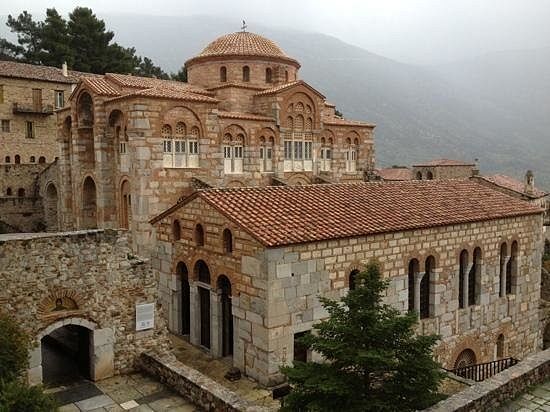 Osios Lukas Monastery. Photo: TripAdvisor
Osios Lukas Monastery. Photo: TripAdvisor There are many of stories I could share, but I want to share one more incredible story. My wife and whole family and I went to Ionian village, where I was serving as the priest. Part of going to Ionian Village2 going around to different monasteries and holy places, and we went to the monastery of Osios Lukas, Blessed Luke. We were at this monastery together with hundreds of children from Ionian village; it was noisy, and we were going to have Vespers in the main church there at Osios Lukas. But there was some time before services, and so I thought I would slip away by myself for just a few minutes and pray. I went into their small chapel and prostrated myself before the Royal Doors. I had just began to pray before the Royal Doors, when I looked up and saw the face of an inmate, who was the way back in Colorado. I was in Greece. His face was just as clear as looking at you right now. I said, “Lord, why?” This is was an African-American man that had shown absolutely no interest in Orthodoxy whatsoever. I said, “Lord, why am I seeing this man?” No response. I don’t know. When I returned to Colorado I knew I needed to talk to this man about it, but it took me two weeks. I stopped by his cell and I just couldn’t bring myself to say it. And finally, one day, I said, “I have to talk to you.” I had taken videos while we were in Greece, and I showed hours and hours of videotapes to the men. I said, “Have you been watching any of those tapes of my trip to Greece?” He said, “Oh, yeah! I’ve been watching them all!” I explained to him what had happened. His eyes got big and he said, “Why me? Why’d you see me?!” I said, “I don’t know.” I said, “I have no idea. But your face was there just as clear as anything.” And so I sent him a booklet on Osios Lukas. One thing led to another, and down the road I had the privilege of baptizing him as Lukas, after Blessed Luke.
One of the units there was a kind of honor unit. The goal of that place was to work men through this maximum-security prison and to eventually get them back to a penitentiary. But to do that, they had to prove themselves faithful each step of the way. And so, at the very last step I could go in and actually do church services with the men. I had about three of the Orthodox in there, and I was doing a service every Sunday evening. Another man came who wasn’t Orthodox, but he liked to come anyway. One day he was talking to me and he said, “You know on the outside I was a professional musician.” And he said, “Father, I miss playing the guitar so much.” I said, “Well I’ve got a guitar. I’ll bring it to the service next Sunday and you can play us a tune before we start our service.” And so I brought in the guitar that Sunday and every Sunday. He played it, and he was good, he was really good.
One day he said to me, “Father, you know,” he said, “I could make this guitar sing. If only I had a pick.” I said, “Well, that’s nice.” He said, “No, no. It’s got to be a Martin 35 millimeter pick. If I had a Martin 35 millimeter pick… the things I could do with this guitar!” I said, “Well, uhh, I don’t know what we can do about that.” And I kept forgetting every week, I was going to bring a pick in and I just kept forgetting. One Sunday I was getting ready to go there and I thought, “Oh my gosh, I forgot his pick.” So I took the little plastic clip from a bread bag and said, “I brought this. Would this work?” But he said, “Ugh. Father, I need a Martin 35mm.” So I left and I was gone for a few weeks, and when I came back, I showed up Sunday night, and he said, “Father, you’re not going to believe this.” When this man first came to me, he said, “I don’t know if I believe in God. I’m just here; these other guys talked me into coming. I don’t know if I believe in God.” Now he said, “I decided to put God to the test, and so I prayed and said, ‘God, if you’re real, bring me a Martin 35 millimeter pick’.” I thought, “Ah, I should have brought him one of those picks!” Now, these men worked in a little factory, where they could be tested to make sure they were fit to go back to another prison. They had to go through a metal detector, both going and coming into this place. So, they were walking along, and each one has to go through the metal detector; this is down in the very valley of this prison, far removed from anything. This man walked up, took his turn at the metal detector, and looked down… and lying on the ground is a pick. He picks it up—and it’s a Martin 35 millimeter pick. He had it with him, and he said, “Father, I can’t keep this in my possession.” He said, “I want you to take it.” But he said, “I believe in God. How that pick got there, God only knows.” God loves these guys. It’s ncredible.
The Scriptures say that when the Son of Man comes in His glory and all the holy angels with Him, then He will sit on the throne of His glory, and the King will say to those at his right hand: “Come, you blessed of my Father, inherit the Kingdom prepared for you from the foundation of the Earth. For I was in prison, and you came to me.” Then the righteous will answer him, “Lord, when did we see you in prison and come to you?” And the King will answer and say to you, “Assuredly I say to you, in as much as you did it to the least of these my brethren, you did it to Me.” Right now with Orthodox Christian prison ministry we are facing some uphill battles. Believe it or not, there are states, even my state of Colorado, which are not even recognizing the Holy Orthodox faith as being a legitimate religion. Can you believe that? We’ve had to go in to several states and fight this fight. We did it in Massachusetts, we did it in Indiana. In Colorado I met with the director of the State Department of Corrections, and he’s Orthodox. I said, “They’re not allowing us to come into the prisons because they say they don’t think Orthodoxy is a legitimate religion.” He said, “I’ll take care of it.” He did. We are now a legitimate religion in the state of Colorado!
But when we talk to the people in other states, they end up saying, “We want you! Please come! Bring these programs in! This is tremendous; we want the Orthodox Church to be a part of us.” But we’ve got our work cut out and we ask you to pray for us as we seek to make these things happen around the United States. Our goal in Orthodox Christian prison ministry is to establish Orthodox teams in every single state, and to have those teams first develop volunteer coordinators or team leaders in each state who will then coordinate and have people available—both priests and laypeople—to go into the prisons and to bring the Orthodox faith. We have Orthodox people in prison right now. There is one state where there were four Orthodox in one prison, and chaplain Patrick, who’s the director of OCPM, called a priest and said, “We have four Orthodox in a prison not far from you. Would you be willing to go in there?” But he said, “Well what kind of Orthodox are they?” When I told him what ethnicity they were, he said: Let them take care of their own!” God, help us.
Our goal is to make sure that such people as the priest who said that, or laypeople who think like that, are educated are able to go in visit these men and help them. Orthodox Christian prison ministry offers tons of free stuff. If any man or woman in prison writes our office and says, “I’m interested in the Orthodox faith” or “I’m Orthodox. Could you send me something?” we have books and icons that we can send out. The icons I have brought were made by men in prison. We also have a number of books, including prayer books. I have brought a book here called Journey—a wonderful set of writings of the Early Fathers. It really helps these men see what the Early Church was about and what these great men and women of God had to say.
For more information on the OCPM, please visit their website. To watch more videos from OCPM, see their YouTube channel.
* * *
Update:
Fr. Stephen, who gave this presentation several years ago, has given us updates on the lives of a few people mentioned in this transcription. A few years ago, the former Rastafarian (named Peter) who got his Master's degree in Criminal Justice was flown to the White House to explain why his probation program is the most successful in the nation. As Fr. Stephen says, “God can indeed take a life that others think is totally corrupt and truly ‘create a clean heart’ in that person.” And apparently not only have some prisoners had a change of heart. The priest who at first declined the request to visit some Orthodox prisoners in his locale due to their ethnicity eventually went, and loved the ministry with those precious men—like the servant who first said “no” but then did his master’s bidding anyway.
Fr. Stephen also asks that our readers pray for Anthony, who has not been able to keep his faith under these dark and difficult prison conditions. May the Lord give him the strength to return to His fold.

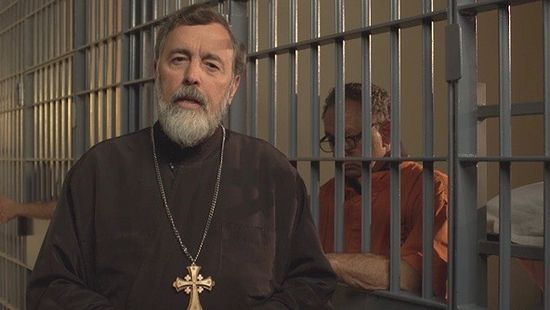
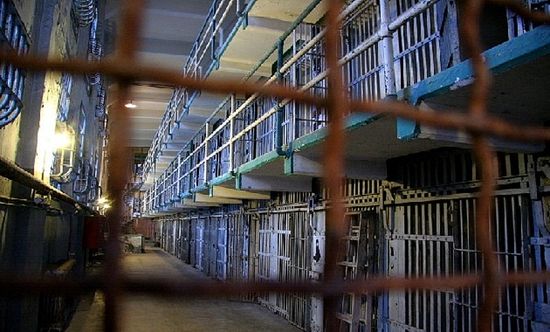
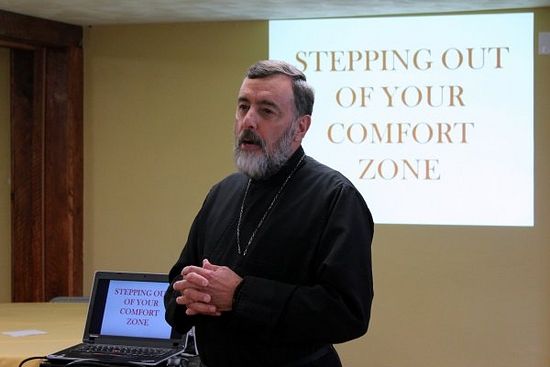
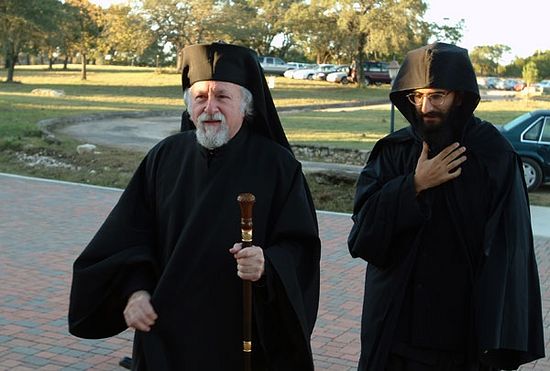
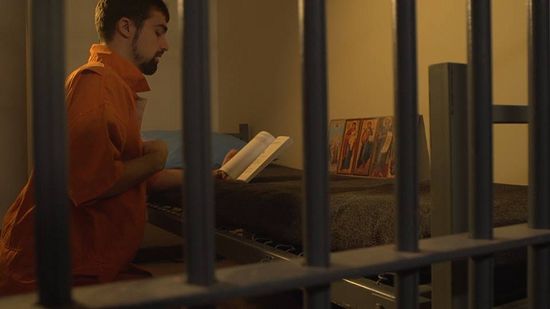
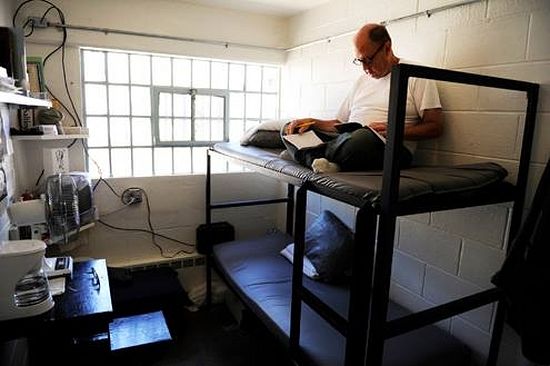
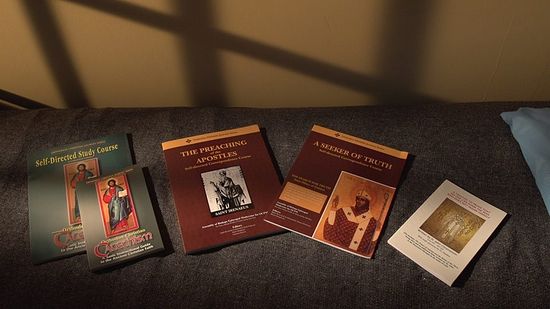
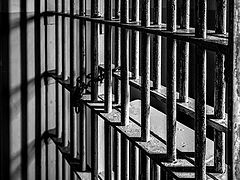
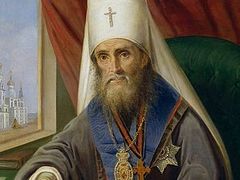
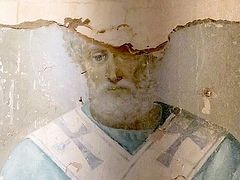
As an ex-convict, once imprisoned due to ultraviolent skinhead crimes, I can attest to the dark sense of hopelessness and futility we feel behind bars.
As we reflect on the difficulties regarding the transformation of those incarcerated, we must also be mindful of the history and societal manipulation leading to where we find ourselves today.
A carefully crafted Society that received only poverty and addiction reflects the same struggle we find in the prisons.
Be not deceived, the high incarceration rates in the African American population were calculated and orchestrated.
Orthodox
I emailed you 2 weeks ago & someone returned my email stating that you were on vacation or out of town & that you would contact me but I've yet to hear from you. I communicate with a prisoner & really need your help and advise.